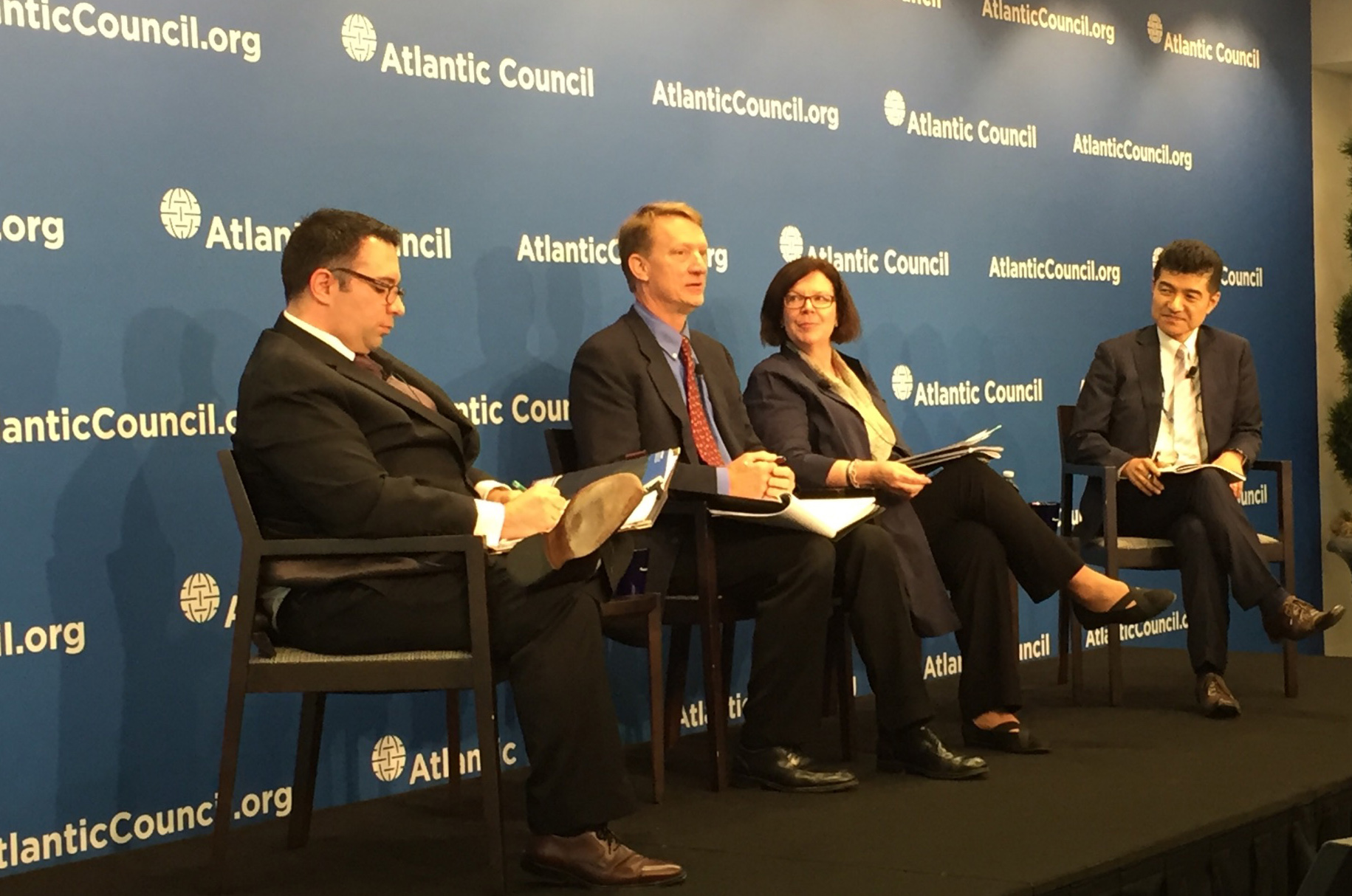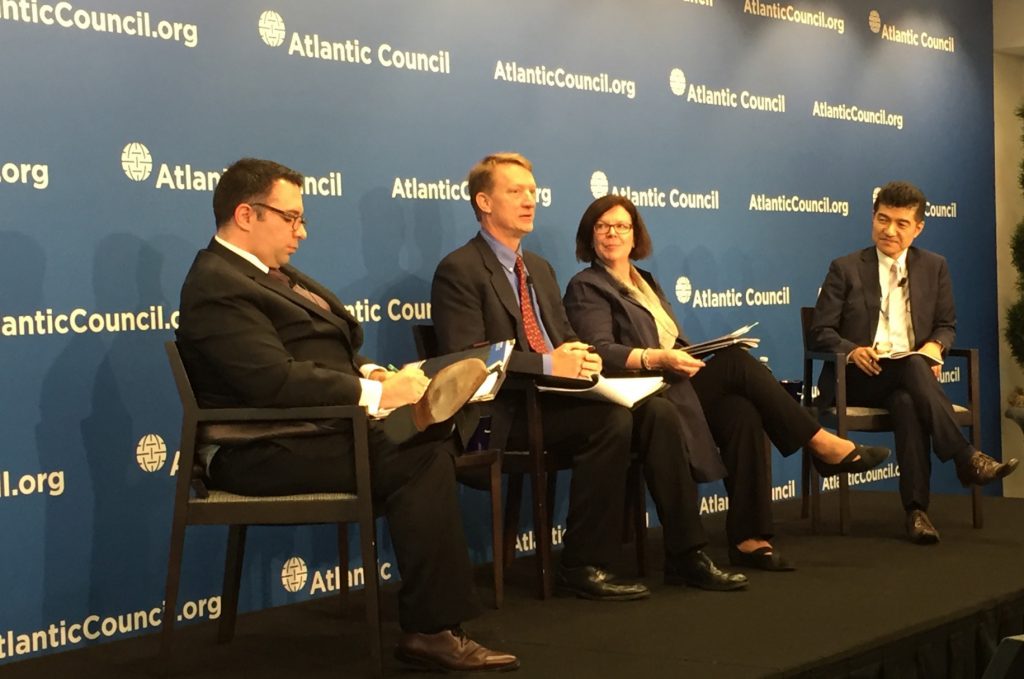
Atlantic Council report recommends Japan bolster self-defense forces while maintaining close military ties with the United States
Japan should take on a more active role in regional security but remain closely under the United States’ military umbrella, according to a new Atlantic Council report presented on Nov. 15.
The report, “Japan’s Security Role and Capabilities in the 2020s,” produced after a yearlong study of the Pacific nation’s military, technological, and economic capabilities, makes a number of recommendations for Japan’s defense posture.
“The overall role that Japan should take on in the region is what I call ‘regional security leader,’ which I define as a nation that can take the lead in organizing multilateral responses to regional security challenges,” said Roger Cliff, the report’s author and a Nonresident Senior Fellow at the Council’s Brent Scowcroft Center for International Security.
Amid rising tensions between the United States and China in the South China Sea, North Korean missile tests, and the ever-looming Taiwan question, the United States needs to secure a capable and reliable partner to maintain the balance of power in the Asia-Pacific region, Cliff said, and Japan is a prime candidate.
But Japan doesn’t possess a full army. Its military wing, the Japanese Self-Defense Forces (JSDF), is still limited in size and functionality by post-World War II agreements with the United States. Under current provisions, Japan’s external defense is relegated mainly to US armed forces.
Cliff said it’s time for that to change, arguing for a more robust JSDF — but one that maintains close ties with the United States and stops short of full military autonomy.
“I’m also not advocating for Japan to become a fully autonomous security actor with a complete set of military capabilities and complete freedom of action,” Cliff said, adding that he recommends that Japan “maintain its close alliance with the US and rely on the US to provide certain key capabilities.”
The United States should work toward shaping Japan into a role model for the Asia-Pacific region, Cliff explained, one that promotes the balance of power not through sheer firepower, but mutual cooperation. Japan should also take a course that gives it the ability to form regional ties and the institutions to enforce them, he added.
David Shear, the State Department’s Assistant Secretary for Asian and Pacific Security Affairs, agreed with Cliff’s vision of Japan as a regional mediator.
“It should be a region that respects the rule of law, freedom of navigation, and freedom of lawful commerce, it should be a region that features open, inclusive security architecture, in which participants don’t resort to coercion in order to achieve their goals,” Shear said in his keynote address. “And, of course, it should be a region that not only respects the rule of law internationally, but one that respects human rights. Our security strategy is designed to pursue these goals.”
Shear applauded the recent passage of historic legislation by Japan to allow the JSDF to engage in overseas military operations — a crucial step toward reaching the goal of becoming a regional mediator.
According to Narushige Michishita, a Japan scholar at the Woodrow Wilson International Center for Scholars, the measure is also a key step in Japan’s gradual transition away from isolationism toward internationalism, but not a flat-out rejection of its post-war pacifistic ideology.
“Some people say that Japan is moving away from pacifism toward militarism, but that’s not true,” Michishita said. “Japan is actually moving away from isolationism toward internationalism, and if you hear Japanese people saying ‘We are pacifists,’ don’t buy into it. Japan has never been pacifist. It has supported most of the wars that the United States has fought.”
Sheila Smith, a Senior Fellow for Japan Studies at the Council on Foreign Relations, tackled another misconception: that Japanese society is trending toward nationalism, a potential setback to goals for a greater regional responsibility.
There are no signs of Japan moving in that direction, said Smith.
“Even in the most extreme right wing, you don’t hear any of these issues being treated seriously as a policy agenda for enhancing Japanese security,” Smith said. “I think we can rest assured, so long as the US-Japan alliance adequately ensures Japan’s security, that the political spectrum is not going to veer off and take Japan in a direction that might make the US concerned.”
Smith supported Cliff’s vision of Japan as an important regional actor for promoting stability.
“The definition that Roger presents in his report is leadership through multilateralism,” she said. “It’s leadership in terms of building, sustaining, and contributing to multilateral responses to security concerns … I think Japan has an excellent role to play and has for the last several decades been a strong supporter of a multilateral Pacific.”
Watch full event here:
https://www.youtube.com/watch?v=</strong> <strong>53sn62GCaUc
Alejandro Alvarez is an intern at the Atlantic Council.
Image: From left: Harry J. Kazianis, Executive Editor of the National Interest moderates a discussion with Roger Cliff, a Nonresident Senior Fellow at the Atlantic Council’s Brent Scowcroft Center for International Security; Sheila Smith, a Senior Fellow for Japan Studies at the Council on Foreign Relations; and Narushige Michishita, a Japan scholar at the Woodrow Wilson International Center for Scholars, at the Atlantic Council on Nov. 15. Cliff is the author of a new report, “Japan’s Security Role and Capabilities in the 2020s.”
